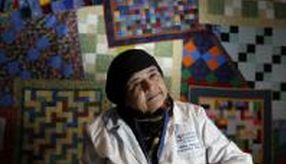Dedicated Pediatrician To Lead Muslim Doctors’ New Free Clinic
Caring for the poor
Dedicated pediatrician to lead Muslim doctors’ new free clinic
By Meredith Heagney
The Columbus Dispatch Friday January 15, 2010 5:50 AM
Dr. Malika Haque grew up in a life of privilege.
She lived in a mansion in India. She enjoyed the benefits of chauffeurs, cooks, butlers and a gardener. She didn’t have to do her own laundry.
She excelled in academics and finished at the top of her class at Madras Medical College in 1967.
At her graduation, her father presented her with a diamond ring and a message.
He told her that just as the rich get whatever material goods they want, they also get the best health care.
“I would like you to remember to serve the poor as you go on in your life,” he said. “Don’t forget them.”
Haque hasn’t.
She came to the United States in 1967, the same year she married Azeez Haque, a physicist. She is a pediatrician at Nationwide Children’s Hospital and a clinical professor of pediatrics at Ohio State University.
From 1973 to 2005, she spent most of her time working at a series of community clinics run by Children’s Hospital for underserved children. Many of those kids lacked insurance and came from low-income families.
Sometimes, Haque would see three generations of the same family sitting in her waiting room, and she had treated them all.
Now, she is medical director of a new free clinic where Muslim health-care workers will serve needy patients from throughout the community. The Noor Community Clinic is restricted to those without insurance or government help such as Medicaid or Medicare.
Haque said the primary aim of the clinic is to serve those who need care, Muslim or not. But the doctors also want to give the community a positive view of Islam, to counter the reports of Muslim extremists and violence that pepper the news.
“Right now, the image of Muslims in general is kind of on the low side,” Haque said.
“We love our country, we love our nation and we love our community. We want to do our best in helping out, especially in these economically challenging times.”
The clinic grew out of a meeting of Muslim physicians at Noor Islamic Cultural Center in Hilliard in 2008. The doctors decided to open free clinics for the uninsured under the name “Muslim Clinic of Ohio.”
Already, the group has opened clinics in Cincinnati and Dayton. The local clinic will operate out of OSU’s Thomas E. Rardin Family Practice Center at 2231 N. High St. The university is a partner in the project.
The local group will celebrate the clinic’s inauguration at 3 p.m. today.
The clinic will open to patients for the first time on Wednesday. To start, it will be open only from 5 to 9 p.m. Wednesdays.
The volunteers — 22 physicians and seven nurses and nurse’s aides — hope to expand those hours and add locations. Some are donating money as well as time, Haque said.
OSU is providing space and equipment as well as a grant for lab work. The group is seeking grants to pay for prescriptions, insurance and other needs.
“We don’t want to push our faith,” Dr. Saida Yassin said. “We just want to show society that, as Muslims, we are united as a group and want to help.”
Changing the opinion “of someone who is ignorant is going to be tough,” Dr. Faozan Narvel said. “That’s not what we’re trying to do.
“The main idea is patient care.”
Other faiths operate clinics in central Ohio. The United Methodist Church for All People on the South Side, for example, offers free space to Mount Carmel Health, whose physicians provide care free or at a reduced cost to the poor.
At the Noor Clinic, the younger physicians and nurses said they are inspired by Haque.
She, in turn, finds inspiration in her many years of treating children. In the community clinics, it was her job to spot illnesses that would otherwise go undetected, as well as to help with emotional and family issues.
She has saved lives, she said, remembering a girl with meningitis and a boy with a ruptured appendix.
Perhaps the memory that drives her the most is of a boy she treated for severe asthma from birth to age 21. He grew up, got married and started working, and it appeared that all was well.
Last year, she got a call that he had died at age 26 from complications of diabetes. He hadn’t visited a doctor because he didn’t have insurance.
“It made me more determined,” she said. “Having one more clinic, maybe it will save one more life.”
mheagney@dispatch.com


















